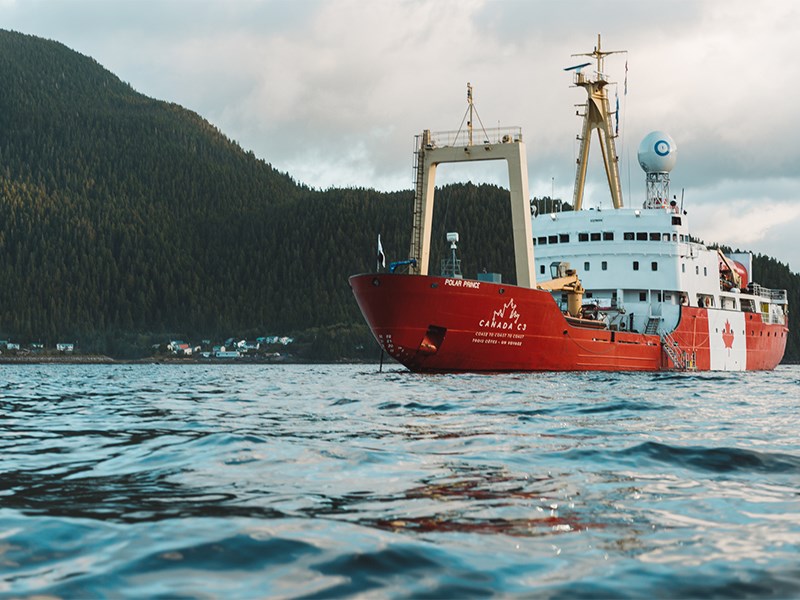A ship unlike most will be arriving in Powell River on Friday, October 20. On board is a special passenger list on a mission with a four-fold purpose, according to expedition leader Geoff Green.
Canada C3 is an icebreaker and a Canada 150 signature project of Students on Ice Foundation. The C3 expedition has gone coast to coast to coast in Canada, and Powell River is one of the last stops on a 150-day expedition.
Primarily a floating classroom for youth engagement, the expedition provides an experiential education about the environment and science, as well as diversity and inclusion. The biggest and most consistent thread throughout is reconciliation, according to Green.
“We're learning about this country's past, including its secret past about the way our country has treated indigenous people,” said Green. “We’re using this Canada 150 year as an opportunity to really look forward at the future and what the possibilities are.”
Prominent local environmentalist Graham May was part of a Students on Ice expedition in 2008.
“One thing I really believe in is people won't care about a thing unless they know it," said May, "and they won't protect it unless they care about it."
May added that Students on Ice takes people to the north, along with people of the north, to know the area through discovery of conservation, education and culture.
“Show them the beautiful, extraordinary worlds at the top and bottom of our planet and that magic will work for itself,” he said.
Tla’amin Nation citizen Devin Pielle recently journeyed to Bella Bella to participate in the blanket exercise, the only official representative for KAIROS Blanket Exercise to participate on Canada C3.
The blanket exercise is an interactive workshop that teaches indigenous history, from first contact with settlers until current times, highlighting the resistance of indigenous people and explaining why we are where we are, according to Pielle.
She has conducted the blanket exercise numerous times before, but Bella Bella’s cultural richness made it a particularly emotionally one.
“It was extremely heavy,” said Pielle. “It was one of the more emotional workshops for myself, but it was also so rewarding because of what was shared. The Heiltsuk who were with us were all young women from age five to 14 and they sang for a couple hundred people, and that was just so powerful.”
According to Pielle, the title of the project celebrates Canada 150 and she’s aware that events held throughout the year marking 150 have been criticized by indigenous and non-indigenous people.
“But it's really evolved into a journey of reconciliation,” she said. “The participants are seeing indigenous communities firsthand and hearing peoples' stories. That really is the beginning of reconciliation; having an honest conversation with the intention of listening.”
Green said when C3 was in the planning stages three years ago the organizers knew there had to be assurances about the authenticity and acceptance of the experience, and that it would follow a navigational course of colonization.
“We really reached out to all kinds of indigenous partners, organizations and leaders and asked their advice about how we balance a journey like this,” said Green.
Green said the people he approached included the chair of the Indian Residential Schools Truth and Reconciliation Commission and all five national indigenous organizations.
“At the end of it all they unanimously endorsed the project because we incorporated their advice, and we have woven it into what we are doing,” said Green. “I guess the approach we have taken has been really respectful and openminded, with open hearts.”
The C3 experience is not just for youth. A cross-section of 300 Canadians have been on every section of the 15-leg journey, including musicians and artists, business leaders, indigenous elders and leaders, newcomers to Canada and Canadians with disabilities who have all contributed to the legacy of the voyage.
"One of the things we have on the ship is a legacy room,” said Green. “It's a sacred space that brings together indigenous and non-indigenous people to talk, share and learn, and it's been a really powerful space on board. In a way, this is a legacy ship that has been a vehicle for the healing this country is going through."
The tentative schedule for Canada C3's visit to Powell River on Friday, October 20, is the ship’s arrival at about 4 pm when students aboard will be welcomed and transported to Willingdon Beach. From 4:30-5:30 pm, carvers, members of Hehewsin Reconciliation Committee and Tla’amin representatives will engage with the students.
Afterward, they will go to Tla’amin Government House, take on a tour and be given background on the process Tla’amin took to self-government. A dinner and then singing, drumming and socializing will also take place.
The next day, the ship departs on its final leg, and Pielle will be on it.
“The people are so diverse, very different occupations and goals and values,” said Pielle. “It's just a very interesting, multi-layered project that would be very silly for me to miss out on.”



